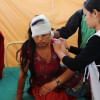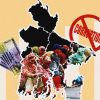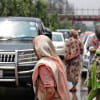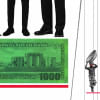The urgent crisis of inequality in Asia
The Asian continental "economic tiger" – after more than a quarter-century of sustained economic growth – is now confronting a defining challenge of inequality. Many Asian countries have prospered and created new wealth. However this wealth, and the prosperity and opportunities that it promises, are not being equally shared. Inequality in Asia has risen by as much as 18 percent from the mid-1990s till now. Around 1.6 billion people continue to live in Asian countries on less than $2 a day. The Gini co-efficient – a common measure of inequality – has worsened in the past two decades in countries where more than 80 percent of the Asian population live.
Last year Oxfam revealed that 240 million people in Asia could have escaped poverty had inequality not increased from 1990 levels. Millions of Asian workers and farmers are being left behind the economic curve, trapped in poverty, despite of being part of the engine that is driving the very growth from which they are being marginalised.
This extreme division of wealth is part of a world-wide trend that is – in every sense of the word – indefensible. Oxfam's new inequality report published today before the World Economic Forum in Davos, "An Economy for the 1 Percent", says that just 62 individuals now have the same wealth as the 3.6 billion people who make up the poorest half of the world's population. As recently as 2010, 388 of the world's richest people shared this dubious honour.
The consequences of these new extremes are huge. Economic inequality can act as a brake on growth, slow poverty reduction efforts, and spark social unrest. Oxfam estimates that the much-heralded goal to eradicate extreme poverty by 2030 will be missed if we do not resolve inequality. The damage that inequality does to people's lives can be seen across our continent – for school children whose education is cut short because they can't afford school fees, for women who work long hours but whose incomes don't cover their rent or the cost of the medicines for their children.
It is good news that economies across Asia continue to grow; people throughout the continent are establishing businesses, developing new technologies, and running multinational corporations.
But inequality of the levels we are seeing in Asia is not simply the natural outcome of talent, hard work and healthy competition. Over the last 30 years, the phenomena of unchecked deregulation, privatisation, financial secrecy and globalisation has allowed big companies and well-connected individuals to use their power and influence to capture an increasing share of the benefits of economic growth. On the other side of the ledger, the benefits for the poorest have shrunk. This trend of a relatively few wealthy individuals and corporations having undue influence may damage fledgling democracies and create wider discontent in Asia.
As the President of the World Bank stated last year, wealth is simply not trickling down – it is being sucked up by a powerful and wealthy minority. And once there, an elaborate system of tax havens and an industry of wealth managers ensure that it stays there – far from the reach of ordinary citizens and their governments.
Tackling extreme inequality across Asia is going to require action on many fronts. Governments, businesses and those creating wealth in Asia must build inclusive and sustainable economies that provide decent jobs with fair living wages. We must act to reduce gender discrimination in the workplace and the wage gap. Governments must invest more in healthcare and education, promote the economic empowerment of women, increase social protection expenditure and tackle injustices in the ownership of assets such as land.
Amongst the most urgent actions is to put a stop to tax havens.
Tax havens allow super wealthy corporations and individuals to avoid paying their fair share of tax. This denies governments of vital revenue that should be spent on schools, healthcare, roads and other essential services and infrastructure. The United Nations Conference on Trade and Development (UNCTAD) estimates that developing countries lose around US$100bn in tax revenues each year as a result of corporate tax avoidance schemes that route investments through tax havens.
Countries in South East Asia are moving towards more economic integration under the ASEAN Economic Community (AEC). The AEC could be an effective place to develop a common political vision for tackling inequality in Asia. It could help to end the era of tax incentives to rich individuals and corporations. It could agree upon harmonised corporate tax in the region and demand transparency in the operations of corporations. Most importantly, it should agree on hard standards of fair living wages and conditions for workers.
G20 governments agreed on steps to curb tax dodging by multinational companies in 2015, yet these measures largely ignore the problems posed by tax havens, and do little to help Asian governments to claim their fair share of taxes. Now, with tax havens becoming an ever more common way of doing business - 109 of the World Economic Forum's 118 partners have a presence in at least one tax haven – it's time to put a stop to this practice.
That is why I will be pressing political leaders, CEOs and others in Davos to act. I will be asking wealthy individuals and business leaders to commit to bring their money back on shore and I will be urging our politicians to work together to agree on a new global approach to end tax havens.
It would be wrong to suggest that many of those gathering for the World Economic Forum do not care about inequality – they do. However, they have collectively failed to recognise that the solution to this crisis is not just about helping the poorest get a foot on the economic ladder – it must also be about tackling the corrupting influence of the extremely wealthy who are pulling up the ladder as the poor try to climb it. If the men and women in Davos take this simple truth on board we can begin to build a new global economy that works for the many and not just the 62.
The writer is Executive Director, Oxfam International.

 For all latest news, follow The Daily Star's Google News channel.
For all latest news, follow The Daily Star's Google News channel. 








Comments